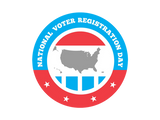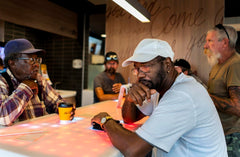Black students’ fight for voting access conjures a painful past
ADA Sign Depot
September 24, 2019

In rural Texas, black students’ fight for voting access
September 24, 2019

PRAIRIE VIEW, Tex. — First came the poll taxes and whites-only primaries that targeted African Americans in this southeastern Texas community.
In recent decades, students at the historically black Prairie View A&M University were required to complete a “residency questionnaire” to prove their eligibility to vote. They saw their power at the ballot box diluted when their campus was carved into separate districts. Some were arrested when they tried to cast ballots, accused of improper voting.
Then came the 2018 midterm elections, when county leaders scheduled fewer early-voting hours on the university campus than in whiter communities nearby.
“Here we go again,” Jayla Allen, a third-generation Prairie View student, thought angrily at the time. She and other students sued, determined to fight what they viewed as racial injustice just as others had done in the past, she said.
Freighted with centuries’ worth of mistreatment of African Americans, the debate over Waller County’s election practices has emerged as a battle about more than just voting hours. The relatively narrow dispute tapped into deep feelings of marginalization and anger over long-standing efforts to keep black voters from the polls.
The intensity of the reaction in Prairie View echoes discussions across the country about racial inequality, which are prompting new examinations of past injustice to understand the present.
“You look at the history, and it inspires you and it draws you to action,” said Allen, a 20-year-old political science major. “I hate the fact that it’s been consistent since the ’70s, and here we are in 2019 fighting the same fight.”
What feels like prejudice to the A&M students is viewed very differently by Carbett “Trey” J. Duhon III, the local judge who helped determine the voting hours last fall.
Duhon, who is white, said there is no question that discrimination has fueled past election practices in Waller County. But last year, he said, the early-voting schedule was driven solely by limited resources and the need to serve a sprawling county. And in the next election, he said, he is aiming to provide as much early voting in Prairie View as at the main county location.
“I understand how this looks,” said Duhon. “I can understand and appreciate the perception for someone who knows the history of Waller County. I just wish people would take the time to learn the facts and the truth today. This isn’t your grandfather’s or great-grandfather’s county, not even close.”
“It kills me to be painted with a brush that I had nothing to do with,” he added.
A county in transition
Once a center of slavery and cotton production, Waller County, population 51,000, is now a mix of rural prairie and Houston suburb. Proceeding west out of the sprawling city, the strip malls, subdivisions and towering interchanges quickly fade into mile after flat mile of pasture and cattle.
What is now Prairie View A&M University was founded in 1876 to help freed slaves enter the workforce, according to university administrator Frank Jackson, 68, who lives in Prairie View and has served as mayor and county commissioner.
Now, Prairie View is dominated by a campus of roughly 9,000 students, a flat expanse of low brick buildings and wide drives known for its engineering and nursing programs.
The university has long had to make do with less money than Texas A&M University in College Station, the flagship of the A&M system. The gap narrowed following protests and lobbying; today, the Prairie View campus boasts a sparkling new stadium, student center and housing.
Progress on race relations is still evolving here. In 2015, Sandra Bland, a 28-year-old African American woman, died in the Waller County jail after she was arrested in a contentious traffic stop on her way to a new job at her alma mater, Prairie View A&M University. Although Bland’s death was ruled a suicide, the rapid escalation of a minor traffic incident propelled the case into the national debate over law enforcement treatment of African Americans.
Long before that case, Waller County was known for one of the highest lynching rates in Texas. Starting in 1923, whites-only primaries virtually excluded blacks from voting.
Even after the passage of the Voting Rights Act of 1965 and the ratification six years later of the 26th Amendment, lowering the voting age to 18, Prairie View students faced barriers.
In the 1970s, a local election administrator demanded that students — but not other residents of Waller County — fill out a “residency questionnaire” that asked, among other queries, if they owned property or paid taxes in Waller.
The students sued, prompting a landmark ruling from the Supreme Court in 1979 affirming their right to vote at school.
In 1992, 14 Prairie View students were charged with improperly voting, including one accused of voting twice — though one of the ballots belonged to his father, who had the same name. Following national attention, all the charges were dropped.
“We know that Waller County has not been totally fair with these kids,” said Jackson, sitting in his campus office surrounded by a crowd of students who gather daily to discuss current events.
“We’ve been here 143 years now,” he said. “The disparity is so blatant.”
The fight over early voting
As the 2018 elections approached, the student government association and numerous political clubs organized rallies, voter registration drives and transportation to the polls.
Then students noticed Prairie View, home to about 5,800 of the county’s 33,000 registered voters, had fewer than half the days of early voting as three other neighboring cities. And those hours were split between a campus location and an off-campus community center.
All three of those other cities — Hempstead, Waller and Brookshire — have larger proportions of white residents than Prairie View, which the Census estimates to be approximately 80 percent black. Overall, Waller County is about 70 percent white.
The students appealed for more hours at a county board meeting. The commissioners voted no. A few hours later, the students regrouped around a table on campus to plot their next move.
“We felt as though we were continuously fighting the same fight,” Allen said.
Then lawyers from the NAACP Legal Defense and Educational Fund reached out to Allen and several other students: Did they want to be plaintiffs in a lawsuit against the county?
Two days after the students’ suit was filed, the county agreed at a special meeting to expand early voting, opening a Sunday polling place at Prairie View City Hall and adding morning and evening hours on campus.
For Allen, it wasn’t enough. Prairie View still had fewer early voting hours than other communities.
“They want us to fall down and break,” she told the Rev. Al Sharpton on his MSNBC television show. “We are strong. We are standing firm.”
Frustrated county officials had hoped the extended hours would lead to a resolution
“Early voting had already begun,” Duhon recalled. “We couldn’t blow up the whole schedule. We were trying to work with the machines we had.”
Turnout in Prairie View mirrored the trend across the country last year: It was dramatically higher than it had been four years earlier. In the city’s two precincts, 2,647 voters cast ballots, nearly three times more than in 2014, according to county data.
Duhon remembers thinking that those numbers showed that voter access had not been impeded.
Leah Aden, a lawyer with the NAACP Legal Defense and Educational Fund who is helping litigate the case, said some voters have to work harder to surmount barriers to access — but that doesn’t mean those barriers don’t exist.
“Voting access is still not equal in the United States,” she said. “Some voters have to jump over the finish line. Others run to the finish line unencumbered.”
'Out of the dark ages'
Duhon said that with limited funds, the goal was to provide convenient access to as many voters as possible. That meant spreading hours and equipment among communities. The county, for instance, offered fewer early-voting hours in the comparably sized city of Katy, which is majority-white.
Duhon also said that long voting lines in Prairie View in 2016 had prompted him to double the number of machines in Prairie View during early voting last year — more than any other city in Waller County.
He disputed that the off-campus polling place in the city of Prairie View, a community center about a half-mile walk from campus, was inconvenient to students.
For Duhon, the allegation of racial bias was a personal affront.
The 49-year-old, who grew up in adjacent Fort Bend County, moved to Waller in 2005 to set up a private law practice. Elected in 2014 to lead the county’s governing board, Duhon said he ran for office to “get Waller County out of the dark ages.”
One of his first acts was to reestablish early voting on Prairie View’s campus in time for the 2016 elections, after years in which there was none.
Still, Duhon acknowledged that some in the county still view Prairie View students as a political threat.
“I think there’s always been this fear that if all the students voted, and they voted in a certain way, they could take over the county,” he said.
Tommy Zorn, 67, a retired horse trainer sipping coffee in the Hempstead McDonald’s on a recent morning, said voters should have to live in the county “a certain amount of time” before they can cast ballots. As he spoke, a woman on an white-and-tan spotted Appaloosa horse trotted up to the drive-through window and ordered a cup of coffee.
“I am the least prejudiced person in this county,” Zorn said, “but the only reason they throw such a fit is so they can vote together and keep this county black.”
An unresolved past
Allen doesn’t think Waller’s white leaders understand how painful and resonant the county’s history of discrimination is for its African American residents.
Her family’s own experience helps explain why the limited early-voting voting hours in Prairie View felt like so much more to Allen.
Her parents had studied at Prairie View in the 1980s, when the campus was carved into three separate districts for county board seats. Her sister had studied there in the early 2000s, when a prosecutor declared that students were not automatically eligible to vote locally and that doing so could be a crime.
The gerrymandered districts were thrown out following a federal investigation. The prosecutor’s warning about improper voting also led to a victory for students, following investigations by the state attorney general and U.S. Justice Department. The prosecutor apologized for what he admitted was “threatening” behavior toward students trying to register.
“This has been happening since 1978,” said Prairie View alumnus Brian Rowland, now 40, a onetime plaintiff in that case who now serves on the Prairie View City Council. “Part of it is about connecting the dots to the longer history. Prairie View students have always been challenged for their basic right to vote.”
The fight over voting hours may become moot under a new Texas law requiring all satellite early-voting centers to remain open the same number of hours as main locations.
Duhon said he is in talks with city and university officials to offer as many early-voting hours on Prairie View’s campus as at the Waller County Courthouse about six miles away.
In other words, some early-voting centers that Waller offered last year could go away. But if he has his way, Duhon said, Prairie View will not be among them.
Alice Crites in Washington contributed to this report.


